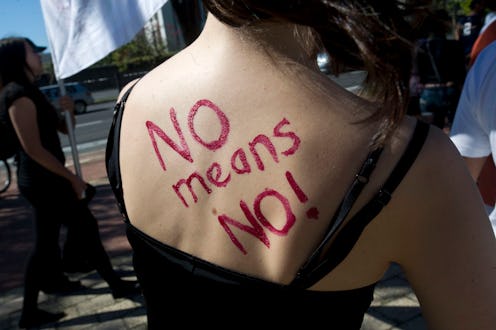Life
6 Ways You May Be Shaming Other Feminists
In today's call-out culture, it's easy to pit women against each other. Even the most staunch supporter of gender equality may fall prey to the ways feminists shame other feminists, especially as the movement continues to grow. In the past century, women's rights have shifted from a fringe movement led by (largely white) suffragists to the well-known call for gender equality we know and love today — one that is openly supported by politicians and pop stars alike.
Of course, such mainstream acceptance is something to celebrate, especially as more diverse voices are able to make themselves heard. On the other hand, feminism now means many different things to many different people — and that can make for discord when one feminist feels that another doesn't fit their particular definition of the word. Take, for example, the constant debates over whether certain public figures are feminist, even after they've come out and identified themselves as such. You'd think that anyone who calls themselves a feminist would be welcomed to the club with open arms, but unfortunately, that isn't always the case.
Let's take a look at a few ways feminists may shame each other below. The list isn't meant to call out anyone, nor is it an attack on other feminists; it's simply a collection of things to avoid if possible. In fact, many are probably intuitive. The solution isn't to beat ourselves up over these behaviors; it's to recognize them and try head them off at the pass. Because feminism is for everyone.
1. Excluding Trans Women
In the late aughts, a new word emerged among the feminist blogosphere: TERF, which stands for trans-exclusionary radical feminist. TERFs, though few in number, are vocal in their desire to exclude trans women from the feminist movement stemming from a fear of women's safe spaces being compromised. It's a pretty overtly transphobic viewpoint, but TERFs aren't the only feminists to deny trans women a place in the movement, often out of a belief that they aren't "real" women. Not only is such exclusion counter to the feminist ideal of a gender-equal society, it also shames trans women for their gender identity.
2. Excluding Men
Like the exclusion of transgender women, some believe that men simply cannot be feminists due to their gender. It's true that we live in a culture set up to benefit men, and as such, they don't experience the same disadvantages as women living in a patriarchy. However, men are ultimately hurt by the patriarchy as well, even if they benefit in other ways. They have as much to gain from a gender-equal society as women — and even if they didn't, what do we gain from excluding potential allies?
3. Slut-Shaming
It's safe to say that most feminists aren't a fan of slut-shaming, even if it's easy to fall prey to it if we aren't careful. (Thanks, cultural conditioning!) However, some feminists are routinely slut-shamed by other feminists — especially when it comes to sex workers, who are often excluded from the movement for their profession. Furthermore, slut-shaming is usually present in the inevitable debate surrounding any pop star who identifies as feminist. Even Beyoncé's commitment to feminism has been questioned based on her sexual stage persona, despite literally standing on a stage emblazoned with "FEMINIST" in gigantic capital letters at the 2014 VMA's. Slut-shaming is truly insidious if it can turn us against the Queen of Pop.
4. Prude-Shaming
The flip side to slut-shaming is rather less discussed yet almost as pervasive. Prude-shaming has been increasingly common in recent years, sometimes from the very feminists who champion a woman's control over her sex life. Prude-shaming can take many forms, such as saying someone is "too old" to be a virgin, but one of the most problematic examples is when a feminist tells someone she isn't sexually empowered due to a lack of sexual experience. Who's to say what makes someone empowered or not? Either way, prude-shaming and slut-shaming are two sides of the same patriarchal coin.
5. Invalidating Other Experiences
Historically, feminism hasn't done a great job of shining the spotlight on women who aren't white, heterosexual, and cisgender. Fortunately, intersectional feminism has been having a Moment-with-a-capital-M lately, especially as the Internet has provided women of all identities with a platform to speak about their experiences. Unfortunately, these discussions can be accompanied by dismissals from other feminists who may not have had the same experiences. This ranks one person's experiences over another's, thereby discrediting their voice and potentially shaming them for speaking out. Besides, it's just plain rude.
6. Questioning Someone's Identification As Feminist
One of the beautiful things about feminism is that it means something different to everyone, but that's often why we all butt heads. Of course, if any of the behaviors above apply to you, it doesn't negate your identity feminist — in fact, questioning someone's identification as a feminist may be one of the most insidious shaming tactics out there. As long as you're committed to the cause of gender equality, who's to say one expression of feminism is any more valid than another? To quote the immortal movie High School Musical, "We're all in this together." Once we learn to accept our differences and work together, girls really will run the world. (Whoops, was that another Beyoncé reference? Sorry not sorry.)
Images: Giphy (3)
